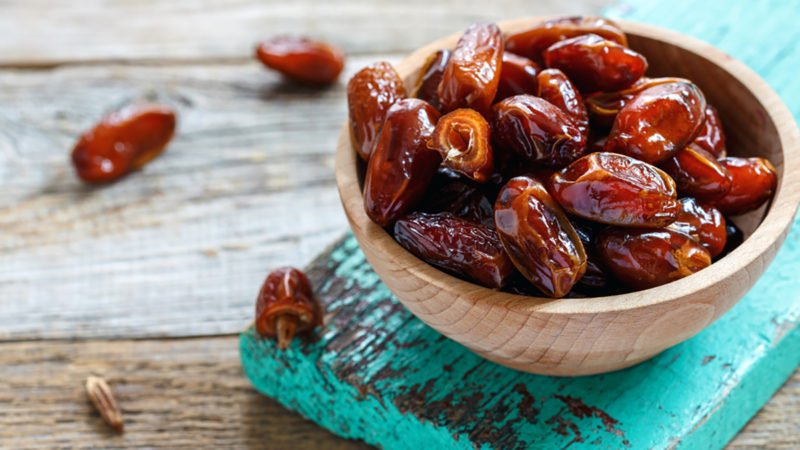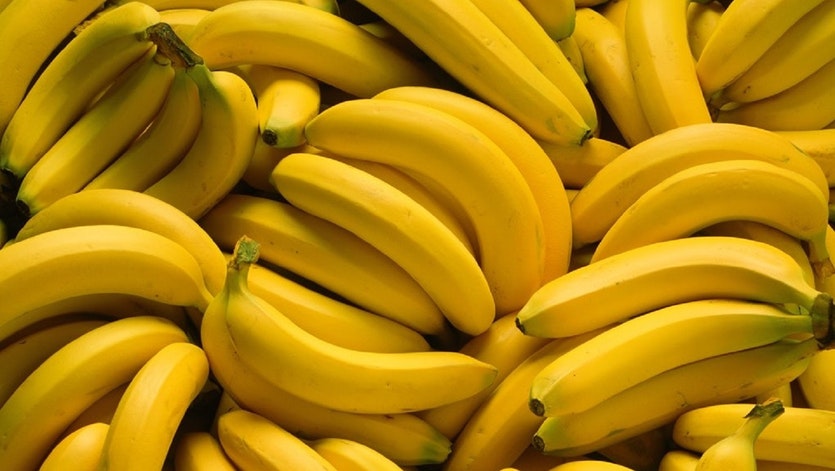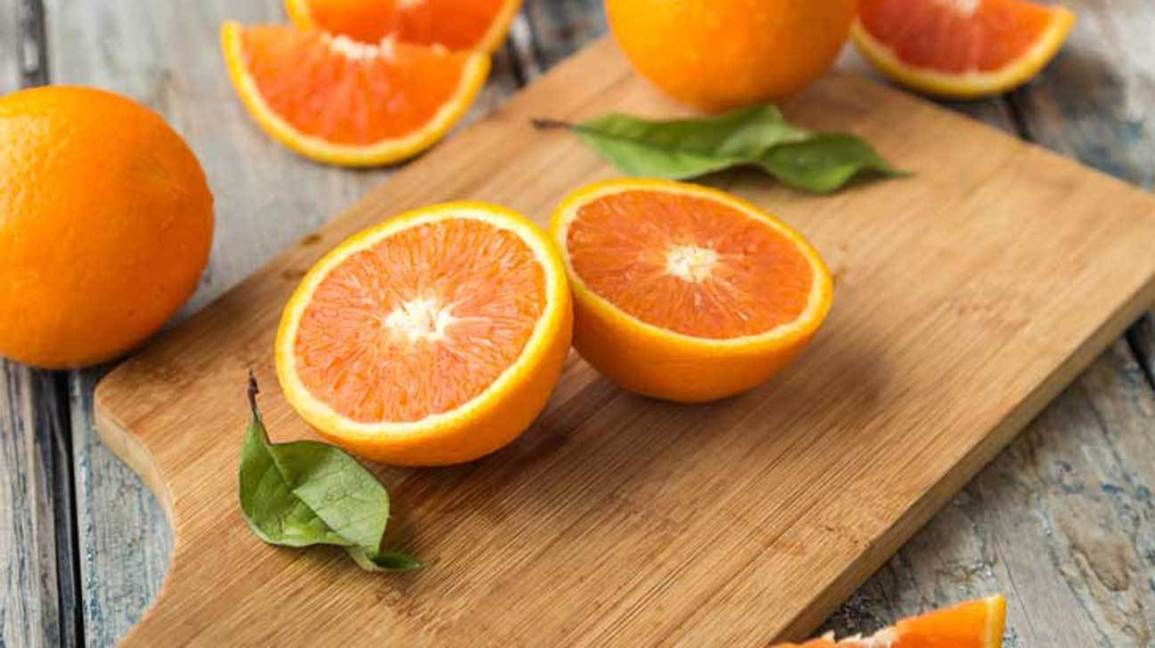1. Lowers cholesterol
Did you know that dates are free from cholesterol and contain very little fat? Including them in smaller quantities in your daily diet can help you keep a check on cholesterol level, and even assist in weight loss. So start loading up on dates today.
2. Protein-rich
Looking to load up on proteins. Adding some dates in your diet may help. Dates are a strong source for proteins that help us in staying fit, and even keep our muscles strong. A lot of regular gym goers are asked to eat a couple of dates every day as part of their daily routine.
3. Rich in vitamins
Dates contain vitamins such as B1, B2, B3, and B5, as well as A1 and C. If you have a few dates every day, you won't have to take vitamin supplements. Not only will it keep you healthy, but there will also be a noticeable change in your energy levels as well because dates contain natural sugars such as glucose, sucrose, and fructose, too. So it works really well as a quick snack.
4. Improves bone health
Dates could do wonders for your bone health too. Yes, you heard us. Dates are rich in selenium, manganese, copper, and magnesium, and all of these are required when it comes to keeping our bones healthy and preventing conditions such as osteoporosis.
5. Strengthens the nervous system
The date is loaded with potassium, and yet contain little sodium, and that goes a long way in keeping your nervous system in order. The potassium helps to reduce cholesterol and keeps the risk of a stroke in check.
6. Rich in iron
Apart from the fluorine that keeps your teeth healthy, dates also contain iron, which is highly recommended for those who suffer from iron deficiency. Severe iron-deficiency anemia may cause fatigue or tiredness, shortness of breath, or chest pain. Plus it's great for blood purification as well.
7. Promotes digestion
If you soak a few dates in water and chew on them daily, your digestive system will behave itself very well. Due to its high fiber content, it is also recommended for those who have trouble with constipation.
8. Improves skin
The vitamins C and D works on your skin's elasticity and also keeps your skin smooth. Plus, if you suffer from skin problems, incorporating dates into your diet might help you in the long run. Plus dates also come with anti-aging benefits and prevent the accumulation of melanin in your body.
9. Fixes hangovers
While we haven't exactly tried it out, but it's said that dates are an excellent way to control inebriation. And similarly, it also helps to cure hangovers. But for best results, you have to rub the skin a bit, and soak it in water overnight and then eat it.
10. Assists in weight gain
The sugar, proteins, and other vitamins in the fruit help in weight gain, especially when you need it. Incidentally, it's said that when eaten with cucumber, dates help to keep your weight at a normal level.
The health benefits of plums include relief from indigestion, influenza infections, weight loss, and anxiety-related problems. The antioxidant power of these fruits helps in preventing and managing osteoporosis, macular degeneration, cancer, diabetes, and obesity. They also help in maintaining a healthy heart by reducing cholesterol levels. Additionally, plums improve cognition, boost immunity, improve cellular health, maintain electrolyte balance, keep the nervous system healthy, and aid in skin care and blood clotting.
What are Plums?
They are juicy and delicious fruits that belong to the genus Prunus of the Rosaceae family which also includes peaches, apricots, and nectarines. They exist in diverse colors and shapes with over 2000 different varieties. Plums are broadly divided into three groups: European-Asian (Prunus domestica), Japanese (Prunus salicina) and Damson (Prunus insititia). China is the leading harvester of plums, followed by the United States, Serbia, and Romania. Within the US, the major production of plums happens in California.
They are small deciduous trees that grow to a height of about 10-15 meters and bear fruits with different characteristics based on the country of origin. They are drupes or stone fruits with a smooth pit and a crease running down on one side. They contain juicy pulp varying from creamy yellow to crimson red. The color of the outer skin may vary considerably from yellow or dark red to purple or black.
Nutritional Value of Plums
Plums contain an assortment of healthy components, vitamins, and minerals. According to the USDA National Nutrient Database, they are an excellent source of vitamins such as vitamin A, vitamin C (ascorbic acid), folate, and vitamin K (phylloquinone). [4] They are also a good source of vitamin B1 (thiamine), B2 (riboflavin), B3 (niacin), B-6, and vitamin E (alpha-tocopherol). The minerals present in them include potassium, fluoride, phosphorus, magnesium, iron, calcium, and zinc. They also supply dietary fiber and offer very low calories without any harmful fats.
Health Benefits of Plums
They are packed with an immense range of phenols and flavonoids, which offer an impressive range of health benefits.
Antioxidant Properties
These fruits contain vitamin C and phytonutrients such as lutein, cryptoxanthin, zeaxanthin, neochlorogenic acid, and chlorogenic acid. These components possess effective antioxidant qualities that help in preventing the damage caused by oxygen radicals called superoxide anion radicals. A study published in the Journal of Medicinal Food, by researchers in France, concluded that the phenols present in plums also extend their protective effect on the essential fats in the neurons and cell membranes against any injuries caused by oxidative stress.
Manages Diabetes
Plums exert anti-hyperglycemic effects and help in combating diabetes. A study published in the journal Biomedical Research in 2005 has shown that consumption of plum extracts aids in reducing blood sugar and triglyceride levels in the body. The flavonoids present in plums exert protective effects against insulin resistance and help to enhance insulin sensitivity in the body.
Prevent Osteoporosis
Consumption of dried plums exerts anabolic and anti-resorptive actions, which aid in maintaining healthy bones. Polyphenols, along with the potassium content present in dried plums, encourage the formation of bones, improve bone density, and prevent bone loss caused by ovarian hormone deficiency. Dr. Bernard P Halloran conducted a research study, published in the Journal of Nutrition, which demonstrated that regular consumption of dried plums helps in the restoration of bone density that has already been lost due to aging.
Aid in Digestion
They are a good source of dietary fiber, along with the components sorbitol and isatin, which help in regulating the digestive system. According to a research study conducted by Dr. Attaluri A, University of Iowa Carver College of Medicine, USA, published in the Alimentary Pharmacology and Therapeutics Journal, dried plums or prunes are more effective in treating digestive disorders such as constipation as compared to other remedies such as psyllium husk.
Healthy Nervous System
Plums contain vitamin B6, which helps in the transmission of nerve signals and aids in the smooth functioning of the nervous system. They also help in the normal growth of the brain and assist in the formation of mood influencing hormones. Tryptophan, an amino acid present in them, helps in the production of the neurotransmitter serotonin, which plays an important role in improving sleep, appetite, and concentration.
Protect Heart Health
Researchers from the Department of Food Science and Nutrition, University of Minnesota, USA, has provided supporting evidence regarding the fact that the regular intake of dried plums helps in promoting fluidity of blood in the arteries. This protective effect aids in the prevention of various cardiac disorders, including atherosclerosis, heart attack, and stroke.
Boost Immunity
Plums are beneficial in strengthening the immune defense of the body due to the presence of high vitamin C content. This vitamin promotes the body’s resistance to infections and inflammations. Research has shown that oriental plums have immunostimulatory constituents that encourage the production of nitric oxide in the body, impede the metastasis of tumor cells, and are valuable in preventing various diseases.
Regulate Cholesterol Levels
Dried plums or prunes help in preventing hypercholesterolemia and hyperlipidemia. A comparative study by the researchers at the Department of Nutrition, University of California, USA, has proven the efficacy of prunes over grape-juice in maintaining healthy levels of plasma and liver cholesterol. The fiber content present in them also adds to the protective effect of the heart by reducing LDL or bad cholesterol and helping to elevate the levels of HDL or good cholesterol.
Anticancer Potential
Plum extracts have been proven beneficial in the treatment of cancer. Studies conducted and published by Dr. Lavanya Reddivari, Dr. Venkata Charepalli, et al, Department of Plant Science, The Pennsylvania State University, USA, have shown that the component epicatechin, present in plums, helps in inhibiting the growth and proliferation of malignant cancer cells and induces apoptosis in human hepatocellular carcinoma or liver cancer.
Skin Care
They are rich in vitamin C, along with other antioxidants, which help maintain healthy, radiant, and youthful skin. The consumption of plums helps in reducing dark spots and wrinkles due to the presence of anti-aging nutrients. Plum extracts are also used in various skin care products such as face wash and face packs.
Culinary Use
They are widely used in food items due to their sweet and tart flavor, as well as their pleasant aroma. They can be enjoyed fresh and can also be added to puddings, jams, and jellies. Plum juice is used in the preparation of alcoholic beverages. Prune juice concentrate works deliciously well as a filling for candies and confectionery products, and as a binding agent for cereal bars. Plum chutney or dip is famous in Indian cuisine and is served along with stuffed Indian bread. It is also relished as a condiment along with the meat delicacies.
Ever wondered what kind of goodness there is in a banana? In addition to being rich in vitamin B6, bananas are a healthy source of vitamin C, dietary fibers and manganese. Bananas are also fat-free, free from cholesterol and virtually free from sodium. So what do you mean by these for your health?
Health benefits of bananas
1. Bananas are one of the best fruit sources of vitamin B6 Bananas vitamin B6 is easily absorbed by your body and a medium-sized banana will provide around a quarter of your daily vitamin B6 requirements.
Vitamin B6 helps your body:
produce red blood cells,
Metabolize carbohydrates and fats,
turn them into energy,
metabolize amino acids,
eliminate toxic chemicals from your liver and kidneys and
maintain a healthy nervous system.
Vitamin B6 is also good for pregnant women as it helps meet their baby’s development needs.
2. Bananas are respectable sources of vitamin C
You may not associate bananas with vitamin C, but about 10 percent of your daily vitamin C needs will be given by a medium-sized banana.
Vitamin C helps:
Secure the body from damage to cells and tissues,
your body absorb iron better,
Your body produces a collagen-the protein that keeps your skin, your bones and your body together and
Help brain health through the development of serotonin, a hormone that influences our sleep cycle, moods, and stress and nd pain.
3. Banana manganese is fine to your skin
A medium-sized banana contains around 13 percent of your daily needs for manganese. Manganese helps collagen your body and protects your skin and other cells from free radical damage.
4. Potassium in bananas is good for your heart health and blood pressure A medium-sized banana contains about 320-400 mg of potassium, which satisfies about 10 per cent of your daily potassium needs.
Potassium helps your body maintain a healthy heart and blood pressure. In addition, bananas are low in sodium. The low sodium and high potassium combination help to control high blood pressure.
5. Bananas can help with digestion and help overcome gastrointestinal problems
A medium banana offers around 10-12 per cent of your daily fiber needs. The Health Promotion Board of Singapore recommends a maximum dietary fiber intake of 20 g for women and 26 g for men.
Soluble and insoluble fibers are a big part of your wellbeing. Soluble fiber helps your body control your blood sugar level and get rid of fatty substances such as cholesterol. Insoluble fiber adds weight and softness to stools, making it easier for you to have regular bowel movements. This helps to keep your gut healthy and safe from harmful bacteria.
Bananas, especially newly-ripened ones, contain starch that does not digest (resistant starch) in your small intestine and is able to pass into the large intestine. Such bananas help you manage your weight better as you stay full for longer.
That said, bananas can help you beat gastrointestinal issues such as:
constipation,
stomach ulcers, and
heartburn
6. Bananas give you energy – minus the fats and cholesterol
Bananas contain three natural sugars – sucrose, fructose, and glucose – giving you a fat and cholesterol-free source of energy. As such, bananas are ideal, especially for children and athletes, for breakfast, as a midday snack or before and after sports.
What you eat plays an important role in your oral health.
A diet rich in essential nutrients invigorates your gums and teeth. This is the reason why diet counseling is an important aspect for dental caries prevention and for ensuring a pearly white smile. Dr. Kanchan Sawlani, Dentist and Research Trainee, Indian Council of Medical Research (ICMR) at Safdarjung Hospital, New Delhi says, “A food pyramid is a commonly used tool by dentists to help patients develop healthy eating habits”. Today, we will explore each section of this pyramid.
Protective foods: Some food components are somewhat caries-inhibiting (Cariostatic) and are thus called Protective Foods. These are products rich in calcium and phosphates, for example peanuts, lectin, cocoa, paneer etc. These are, up to a certain extent, capable of buffering the acids produced by the mouth’s bacteria and forming a protective barrier on the tooth enamel. Fluoride (approximately1 ppm) in drinking water and diet strengthens teeth and has an anti-cavity effect.
Breads, grains and pulses: Whole grains such as rotis, paranthas, dalia, cornflakes etc. should be preferred over refined grains like noodles, pastas, biscuits and other bakery products. Refined grains, starchy foods and sugars are fermentable carbohydrates which are the main culprits contributing to acid formation in the oral cavity.
Fruits and vegetables: Not only do these add colour and health benefits to your diet, but they provide roughage and require active chewing which leads to increased salivation that is desirable for cavity protection. Green leafy vegetables are rich in Vitamin A and proteins which keep your teeth and bones in good shape.
Milk and milk products: These are the most important source of calcium in your diet. One should drink a minimum of 250-500 ml of milk daily. Low fat pasteurized milk is preferable as excessive consumption of whole milk can increase blood cholesterol levels.
Meat, fish, poultry and eggs: Meats are rich in proteins, iron, zinc and Vitamin B12. The WHO food guide pyramid suggests that adults should eat 2-3 servings of meat products each day (each serving approximately 110 grams). If not meat, vegetarians can opt for meat alternative like tofu, beans, lentils, nuts and other high protein vegetables.
Fats, oils and sweets: Choose PUFA (Poly Unsaturated Fatty Acids) rich oils like safflower, sunflower, corn, soybean, wheat germ oil, etc. over saturated fats like ghee and butter. Frequent consumption of sweets, chocolates, caramels and cream biscuits should be avoided as these stick to the surface of your teeth and cause greater decay.
Orange is known to have several health benefits and is among the most popular fruits around the world.
Oranges can be had not only as a snack but also as a major recipe ingredient in various dishes. Nowadays orange juice is an integral part of a healthy breakfast thus promoting a healthy start to the day. They're mainly available in two categories — sweet and bitter, with the former being the type most commonly consumed. Generally an orange should have smoothly textured skin and be firm and heavy for its size. These will have higher juice content than those that are either spongy or lighter in weight.
Benefits of eating oranges
High in Vitamin C
Oranges are an excellent source of vitamin C. One orange offers 116.2 per cent of the daily value for vitamin C. Good intake of vitamin C is associated with a reduced risk of colon cancer as it helps to get of free radicals that cause damage to our DNA.
Healthy immune system
Vitamin C, which is also vital for the proper function of a healthy immune system, is good for preventing colds and preventing recurrent ear infections.
Prevents skin damage
Anti-oxidants in oranges help protect skin from free radical damage known to cause signs of aging. An orange a day can help you look young even at 50!
Keeps blood pressure under check
Oranges, being rich in Vitamins B6, help support the production of haemoglobin and also help keep blood pressure under check due to the presence of magnesium.
Lowers cholesterol
According to a study by US and Canadian researchers, a class of compounds found in citrus fruit peels called Polymethoxylated Flavones (PMFs) have the potential to lower cholesterol more effectively than some prescription drugs without side effects.
Controls blood sugar level
Fibre in oranges help by keeping blood sugar levels under control thereby making oranges a healthy snack for people with diabetes. Moreover, oranges have simple sugars. The natural fruit sugar in oranges, fructose, can help keep blood sugar levels from rising too high after eating. Its glycemic index is 40 and normally whatever foods fall under 50 are considered to be low in sugar. However, that does not mean you go about eating too many oranges in one go. Eating too much can spike insulin and may even lead to weight gain.
Lowers the risk of cancer
Oranges contain D- limonene, a compound that is touted to prevent cancers like lung cancer, skin cancer and even breast cancer. Vitamin C and antioxidants present in oranges are both important to build body’s immunity – they help in fighting cancer. The fibrous nature of the fruit also makes it cancer protective. According to a study, up to 15 per cent of cancer cases happen because of mutations in the DNA, which can be prevented with Vitamin C.
Alkalizes the body
While the basic nature of oranges is acidic before you actually digest them, they have a lot of alkaline minerals that play a role in the process of digestion. This property of oranges is similar to that of lemons, which are without doubt among the most alkaline foods.
Good eye health
Oranges are a rich source of carotenoid. The Vitamin A present in them play an important role in keeping the mucus membranes in the eyes healthy. Vitamin A is also responsible to prevent age-related mascular degeneration, which in extreme cases can lead to blindness. It also helps eyes to absorb the light.
Safeguards against constipation
Oranges have both soluble and insoluble fibre. This helps in keeping your intestines and stomach function smooth, preventing irritable bowel syndrome. Additionally, the fibre helps treat constipation to a greater extent.
Useful tip
Oranges like most citrus fruits, produce more juice when warmer — juice them when they are at room temperature. Rolling the orange under the palm of your hand on a flat surface will also help to extract more juice. Vitamin C gets destroyed fast when exposed to air, so eat an orange quickly once cut up.











